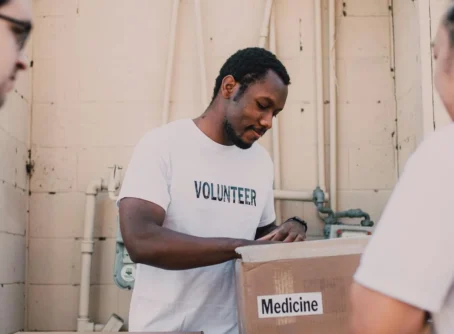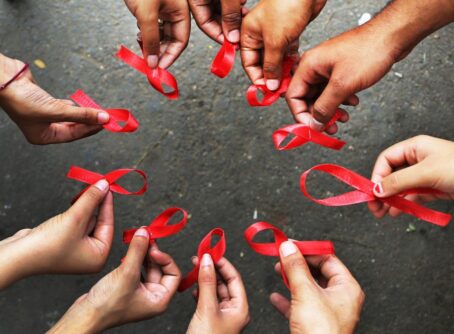
This article originally appeared in Shared Justice, an initiative of the Center for Public Justice (CPJ). Shared Justice is an online publication and community for Christian twenty and thirty somethings interested in the intersection of faith, politics, and justice.
Apostle Angeloyd Fenrick was offered over one million dollars for the apartment building that she currently owns in Ward 8 of Southeast D.C, but she refused to sell. Why? Because this isn’t just any apartment building. This building is the home of Columbia Learning International Ministries (CLIM), a faith-based, Christ-centered non-profit organization located in DC that provides housing, case management services, and spiritual supports to the working homeless. CLIM’s sacred mission and vision calls it to: “Assist participants in their transition to permanent housing, help individuals make and sustain changes that lead to balanced, healthy lives, and encourage restoration of family relationships.” Apostle Fenrick believes that the lives CLIM is able to transform through Christ are priceless and nothing, not even one million dollars, could persuade her to sell.
CLIM was founded by Apostle Fenrick in 1997. Working as a school psychologist at the time, she witnessed homelessness in her city daily as she went to work. Every day a crowd of men would gather around the liquor store across the street and stay there later into the evening. The sight of the men would frustrate Apostle Fenrick; she wished they would realize their potential and find a job. She prayed that God would send someone to help, but she soon realized that the person God was calling was her. Through a long process of praying, listening to the Lord, and practicing patience, Apostle Fenrick decided to use her retirement savings to buy the apartment building that would become CLIM. CLIM advances its Christ-centered mission and increases its capacity to impact the community through forming meaningful partnerships with other community-based, faith-based nonprofits, by partnering with local social work schools to host interns, and by cultivating a volunteer network, including former clients who give their time and skills to maintain the building. CLIM’s faith-based organizational identity influences how it views and addresses homelessness: not as a stand-alone problem, but as a symptom of systemic spiritual and physical poverty.
In January of 2015, there were approximately 564,708 people homeless on a given night in America. While the majority of the homeless population, 85 percent, is made up of individuals, 15 percent is made up of families. The national rate of homelessness in 2015 was 17.1 homeless individuals per 10,000 people. While some states have experienced a slight decline in the homeless population, twenty-three states and the District of Columbia have seen an increase in homelessness between 2007 and 2013. According to the National Coalition for the Homeless, the lack of affordable housing and limited programs that assist with housing has contributed to the current homelessness crisis. It is estimated that the national 2013 Housing Wage, the amount needed to afford rent, is around an $18.79 hourly wage which is above the $14.32 hourly wage earned by the average renter. This gap of almost $4.50 is contributing to the inability to afford housing or stay up to date on payments. This then leads to perpetual homelessness since it becomes a decision between affording housing and paying for other necessities.
A public justice perspective asks us to consider what the right responsibilities and roles are for both government and other key institutions in society in responding to the complex issue of homelessness. The government should have a strong role in working to fight against homelessness in America, but it should not be the sole bearer of this responsibility. One of government’s God-given roles is to promote human flourishing. This can be done by promoting public policies that help to improve the lives of the homeless in America. This can also be accomplished through government partnering with different faith-based and community-based organizations that are working first hand with the homeless in their communities. In addition, government ought to recognize that we live in a pluralist society with diverse communities that have highly particular needs. Therefore, government should create the space needed in our diverse public square for equally diverse civil society organizations, with different faith-based and secular missions, to thrive and make their distinctive impact on their communities. Homelessness in America is a complex issue and requires multi-faceted community solutions to bring about change for those affected.
Faith-based organizations are often at the front lines of the issue of homelessness. A new case study out from the Baylor Institute for Studies of Religion: “Assessing the Faith-Based Response to Homelessness In America,” echoes the approach of CLIM in identifying systemic causes of homelessness. These causes are not just about lack of housing, but a loss of other forms of relational and spiritual capital. With respect to faith-based organizations’ distinctive approach to addressing homelessness, the report notes “FBO homeless ministries are at the forefront of program innovation and organizational transformation for improving positive outcomes for the homeless individuals and families served.” Partnering with their local communities and sometimes government, faith-based organizations are often able to work toward effectively treating the issue of homelessness because they recognize humans as spiritual and relational beings, in addition to beings with material needs. According to the case study, faith-based organizations provide 60 percent of the emergency shelter beds for the homeless population in America. Faith-based organizations’ unique capacity to identify the interdependence of spiritual, physical, relational, mental-health, and vocational well-being has, sadly, often been overlooked.
“Faith-based organizations are often at the front lines of the issue of homelessness.
Faith-based organizations addressing homelessness like those in the Baylor case study and CLIM are often undervalued because their impact reaches into many different dimensions of the root causes of homelessness. As Eric Bauer, Executive Director of the Portland Rescue Mission, stated in the report, “This support is not just in the form of tangible help like shelter meals, clothing and transportation, but also includes homelessness prevention through addictions support groups like Celebrate Recovery, gospel transformation of individuals and families, and other unseen “’leaven from heaven.’” Last fall, President Obama’s Advisory Council for the White House Office on Faith-Based and Neighborhood Partnerships to Address Poverty and Inequality released a report entitled “Strengthening Efforts to Increase Opportunity and End Inequality.” The report captured this idea that poverty is not just physical, but relational and spiritual: “Government resources must therefore sow the seeds of community-based efforts to heal and unlock communities’ and individuals’ inner assets triggering and sustaining lasting external and internal transformations. We should remember that capital is not just financial; it is social, informational, experiential, spiritual, emotional, natural, and cultural.”
CLIM likewise advances its faith-based mission to systemically address homelessness not just through the provision of affordable housing, but through its extensive relationships with other community and faith-based partners. Apostle Fenrick explained, “We offer counseling, credit repair, social workers, parenting classes, case management planning for their lives, and opportunities for prayer.” In addition, CLIM has opened its doors to EDEN, an urban garden ministry, that provides fresh produce to clients, as well as summer employment to community youth.
Faith-based organizations like CLIM are deeply connected to the ecosystem of their local communities. Interestingly, just as CLIM’s faith-based mission calls it to address the needs of an individual through a holistic, community approach, the needs that CLIM has as an organization are also met through its deep roots in community life. Apostle Fenrick has not taken a salary since she first started CLIM and she attributes the work that CLIM has been able to accomplish to the volunteers that have been willing to give their time and services to the organization.
Partnering with faith-based organizations like CLIM is one way for people to extend love and support to the most vulnerable members of our communities. Beyond direct acts of service, we should consider how we can advance public justice in addressing homelessness through advocating for public policies that both support the poor among us, and support the capacity of diverse organizations that serve the homeless to thrive, recognizing that faith-based organizations make a large contribution to the alleviation of homelessness in communities around the country. While the issue of homelessness may seem like a steep challenge to take on, with the work of individuals, faith-based organizations, advocates, and government, homeless communities around America can be assisted, supported, and loved.
-Ashley Fisher is a History and Political Science major at Vanguard University and was a former Intern at the Center for Public Justice.





